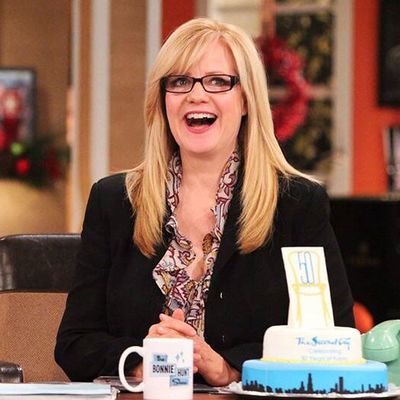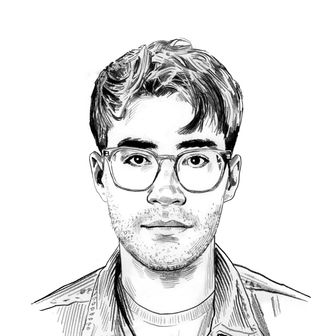
With Ellen DeGeneres ending her reign as daytime television’s headliner after 19 years, much has been made about the role that kindness, or the lack thereof, has in the talk-show landscape. In daytime, which will experience a major shift with Ellen’s departure, the attribute has become a currency of sorts. Rosie O’Donnell pointed the genre in that direction after being branded “The Queen of Nice,” and Ellen followed suit with her now-ironic “Be kind to one another” sign-off. But when it comes to genuine warmth and kindness on daytime television, nobody did it better than Bonnie Hunt, whose talk show led with an authenticity and heart that was unparalleled on daytime.
Anybody who caught one of her late-night appearances knew that Hunt had the chops to host a talk show, so naturally she’d long been courted for the gig, notably turning down The Late Late Show in 2005. From Carson to Letterman, she had a unique ability to have instant chemistry with whoever she sat next to — including Regis Philbin, who urged her to make the jump during one guest-hosting stint on Live with Regis and Kelly. “You were born to be a talk-show host,” he told her. She finally obliged in 2008 with the launch of her titular show, a wholesome, old-school Dean-Martin tribute with a Midwestern charm.
The Bonnie Hunt Show, which aired for two seasons from 2008 to 2010, was prime comfort TV that highlighted its host’s sharp wit and down-to-earth sensibility. It was a comedic playground, home to sketches like Hunt and Niecy Nash’s Real Housewives parodies, remote pieces shopping at Costco, and segments like “Mail From You Guys” and the “Feel Good Moment of the Day.”
There was a sense of community surrounding the show that played to Hunt’s strengths. As one of seven kids who cut her teeth at the Second City, it’s no surprise that she excels as a member of a team. On her talk show, that team was filled with familiar faces, like her writing partner and producer Don Lake, her frequent co-star Holly Wortell, and of course, a star in her own right, Hunt’s mom Alice, who Skyped in for her own weekly segment. They all helped create an environment of camaraderie that Hunt thrived in.
That banter extended to her interviews, which ran the gamut from fresh talent to reality stars, but she was most in her element when she was talking to the legends she revered. “I made sure I got everybody on I ever wanted to talk to in my life,” she told Danny Pellegrino on the podcast Everything Iconic. Guests like Carol Burnett, Dick Van Dyke, and Betty White looked right at home on the nostalgic set and displayed Hunt’s deep adoration for pop culture.
But the heart of the show was when she’d simply tell a story to camera, demonstrating a Regis-like ability to talk about anything and make it entertaining. Her stories were well-oiled machines, as if they’d been told for years around the porch on a summer night in the old neighborhood. Whether a heart-wrenching story about her father’s passing and the chance encounter that kept her in nursing school through her grief or simply about accidentally buying too many power strips at Bed Bath & Beyond — each one had an authenticity and sense of humor that connected with the audience.
She’s a storyteller, no matter the medium, and her film career has allowed her to tell some great ones, like Jerry Maguire, Jumanji, and Return to Me — the latter of which she wrote and directed. And though her sitcom endeavors were short-lived, she was a trailblazer who was not only one of the first women to write, produce, direct, and star in her own show, but was wildly prolific as well. In Life With Bonnie alone, Hunt and Lake wrote all 44 episodes, and Hunt herself directed all but three of those.
Though wide-ranging, her work is also incredibly cohesive, with the common thread being a humor grounded in reality, often displayed through her razor-sharp improv ability on par with her friend and co-star Robin Williams. The tool has served her well onscreen (famously ad-libbing Jerry Maguire’s “Don’t cry at the beginning of a date. Cry at the end, like I do.”) and it carried over to daytime where she was a pro at being quick on her feet.
Hunt’s show also marks a midpoint of sorts in the trajectory that daytime television has taken — once a place for lesser-known personalities to make a name for themselves as hosts became A-list and A-listers became hosts. Hunt, a successful actor, demonstrated this in action. Since then, full-fledged stars like Drew Barrymore and Kelly Clarkson (who will be taking over for Ellen as NBC’s “headliner”) have waded into the highly competitive waters of daytime. But the genre doesn’t discriminate when it comes to fame, and after two seasons, The Bonnie Hunt Show was one of many casualties.
When describing her film Return to Me, Hunt has said she set out to make a movie that you wanted to crawl into. It’s a notion that describes her work as a whole, and The Bonnie Hunt Show’s warmth and joyful atmosphere certainly fit the bill. She connected with the everyday person so well because she herself was an everyday person first and foremost. In a landscape that’s now so full of overly polished shows creating artificial moments for the instant gratification of YouTube clicks, we could do with some more Bonnie Hunt.


